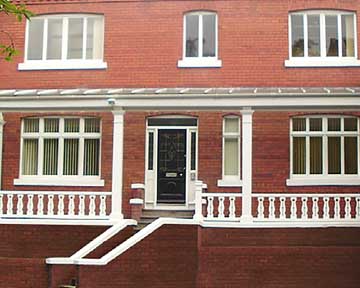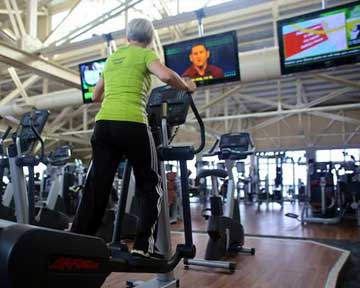Our experienced physiotherapists at Liverpool Physio can perform detailed assessments to discover if discomfort or limitations are caused by the presence of osteophytes. We have the knowledge and skills to manage the symptoms and return you to your normal daily activities. Whatever the severity of your condition you can benefit from physiotherapy assessment and treatment.
An osteophyte is a small protuberance, or lump of bone that typically grows around small joints or on the vertebrae. People tend to develop them as they age and are frequently unaware they even have them. They do not usually require any kind of intervention, but can cause some people issues if their location leads them to compress adjacent nerves and muscle. In such cases the osteophyte can cause pain, stiffness and swelling within the surrounding tissues, reducing mobility in the affected joint.
Osteophytes are one of the bodies' responses to excessive wear and tear on bones and cartilage. They are nodules of new bone growth intended to protect and repair the damaged bone surface.
Although many kinds of damage may trigger the growth of an osteophyte they are most commonly associated with the damage caused by osteoarthritis. When osteophytes grow along the spinal vertebrae it is usually as a result of a specific type of arthritis called ankylosing spondylitis. Other types of bone damage that can trigger osteophyte growth include;
 Above: Osteophytes are bone gowths which can occur around a joint causing pain and discomfort.
Above: Osteophytes are bone gowths which can occur around a joint causing pain and discomfort.
The symptoms that help identify if you have an osteophyte include:
Our specialist physiotherapists at Liverpool Physio can carry out a comprehensive assessment to diagnose the presence of any osteophytes. Where they are present in deep tissue or within a joint capsule an MRI scan or x-ray may be required to highlight their severity. Otherwise they can often be diagnosed though a physical examination testing joint mobility and muscle strength.
For more information on how physiotherapy can help treat osteophyte, please email office@liverpoolphysio.co.uk or ring us on 0151 558 0077.
At Liverpool Physio, we want to gain as much information as possible about your condition to ensure we give you the best treatment. In your first appointment with us, our physiotherapists will carry out an assessment which has two parts:
A discussion between you and our physiotherapist to find out the cause of your condition and what symptoms you are experiencing, and how your condition is affecting you and your lifestyle.
An assessment of your range of pain, range of movement, and a series of special tests to identify the presence of the any osteophytes.
If you have a serious impairment due to an osteophyte you may require surgery to remove it. In this case, our physiotherapists would be happy to see you for assessment and treatment after your surgery, to help you recover.
At Liverpool Physio, Our physiotherapists will ensure you receive specialised treatment in addressing the issues caused by osteophytes. Depending on the extent of joint impairment and pain level, your treatment may involve:
We are also happy to give advice on activity modification and footwear. Where the condition affects the foot, some orthopaedic padding can reduce the direct pressure of footwear on the osteophyte. As can wearing less restrictive footwear.
At Liverpool Physio you will experience a personalised treatment session. Each appointment will be aimed at you returning to your everyday activities and what you enjoy.
If you are experiencing sharp pain or swelling in your joints, especially your feet, and feel unable to walk normally, one of our experienced physiotherapists will be happy to see you for an assessment.
You can contact us directly to arrange an assessment and we can advise you if further treatment is recommended, or give you details on self-management for minor cases. To arrange an appointment please email office@liverpoolphysio.co.uk or call 0151 558 0077.
Osteophytes can be very painful and severely impact on a person???s mobility and freedom of movement. However, they are usually easily managed there are plenty of treatment options, from the conservative up to surgical intervention.
At Liverpool Physio we want to ensure you get the best treatment for your injury and we will use mobilisation techniques, strengthening exercises and activity specific treatments to help you recover.
For more information on how physiotherapy can help treat osteophytes, or to book yourself an assessment, please email office@liverpoolphysio.co.uk or ring us on 0151 558 0077.
↑ Back to top
What is an Osteophyte?
An osteophyte is a small protuberance, or lump of bone that typically grows around small joints or on the vertebrae. People tend to develop them as they age and are frequently unaware they even have them. They do not usually require any kind of intervention, but can cause some people issues if their location leads them to compress adjacent nerves and muscle. In such cases the osteophyte can cause pain, stiffness and swelling within the surrounding tissues, reducing mobility in the affected joint.
What causes Osteophytes?
Osteophytes are one of the bodies' responses to excessive wear and tear on bones and cartilage. They are nodules of new bone growth intended to protect and repair the damaged bone surface.
Although many kinds of damage may trigger the growth of an osteophyte they are most commonly associated with the damage caused by osteoarthritis. When osteophytes grow along the spinal vertebrae it is usually as a result of a specific type of arthritis called ankylosing spondylitis. Other types of bone damage that can trigger osteophyte growth include;
- Bone Fracture, particularly multiple fractures of the same location.
- Biomechanical abnormalities that produce irregular joint motion causing excessive erosion of part of a joint.
- Regular wear and tear as part of the aging process.
- Excessively tight tendons can create stress in the bone prompting osteophyte growths.
- Certain bone diseases or infections, such as osteomyelitis.
 Above: Osteophytes are bone gowths which can occur around a joint causing pain and discomfort.
Above: Osteophytes are bone gowths which can occur around a joint causing pain and discomfort.What are the symptoms of Osteophytes?
The symptoms that help identify if you have an osteophyte include:
- A physical lump, hard to the touch, projecting from the bone near a joint.
- Pain in a joint, where the osteophyte compresses a nerve or other tissue.
- Sensation of pins and needles or numbness in the surrounding tissue or limb.
- Catch/release sensation as lump interferes with smooth motion of joint.
- Full range of movement can be blocked by the position of the osteophyte.
- Weakness in an affected joint as tendons and ligaments are impeded by the osteophyte.
- Pain rapidly reduced by taking pressure off the affected joint.
- Swelling of the joint affected and surrounding tissues.
- Reddening or bruising discolouration of the skin around a joint.
- Joint locking, as a piece of the osteophyte breaks off lodging in the space between the joint impeding any movement and causing a lot of pain if moved.
How is an Osteophyte Diagnosed?
Our specialist physiotherapists at Liverpool Physio can carry out a comprehensive assessment to diagnose the presence of any osteophytes. Where they are present in deep tissue or within a joint capsule an MRI scan or x-ray may be required to highlight their severity. Otherwise they can often be diagnosed though a physical examination testing joint mobility and muscle strength.
For more information on how physiotherapy can help treat osteophyte, please email office@liverpoolphysio.co.uk or ring us on 0151 558 0077.
What would a physiotherapy assessment for Osteophytes involve?
At Liverpool Physio, we want to gain as much information as possible about your condition to ensure we give you the best treatment. In your first appointment with us, our physiotherapists will carry out an assessment which has two parts:
Subjective
A discussion between you and our physiotherapist to find out the cause of your condition and what symptoms you are experiencing, and how your condition is affecting you and your lifestyle.
Objective
An assessment of your range of pain, range of movement, and a series of special tests to identify the presence of the any osteophytes.
If you have a serious impairment due to an osteophyte you may require surgery to remove it. In this case, our physiotherapists would be happy to see you for assessment and treatment after your surgery, to help you recover.
What would physiotherapy treatment for Osteophytes involve?
At Liverpool Physio, Our physiotherapists will ensure you receive specialised treatment in addressing the issues caused by osteophytes. Depending on the extent of joint impairment and pain level, your treatment may involve:
- Joint mobilisations
- Ice treatments
- Heat treatments
- Strengthening exercises
- Surgical removal of the osteophyte
- Cortisone injections
- Advice on managing arthritis
We are also happy to give advice on activity modification and footwear. Where the condition affects the foot, some orthopaedic padding can reduce the direct pressure of footwear on the osteophyte. As can wearing less restrictive footwear.
At Liverpool Physio you will experience a personalised treatment session. Each appointment will be aimed at you returning to your everyday activities and what you enjoy.
How can I arrange a physiotherapy assessment for Osteophytes?
If you are experiencing sharp pain or swelling in your joints, especially your feet, and feel unable to walk normally, one of our experienced physiotherapists will be happy to see you for an assessment.
You can contact us directly to arrange an assessment and we can advise you if further treatment is recommended, or give you details on self-management for minor cases. To arrange an appointment please email office@liverpoolphysio.co.uk or call 0151 558 0077.
Summary
Osteophytes can be very painful and severely impact on a person???s mobility and freedom of movement. However, they are usually easily managed there are plenty of treatment options, from the conservative up to surgical intervention.
At Liverpool Physio we want to ensure you get the best treatment for your injury and we will use mobilisation techniques, strengthening exercises and activity specific treatments to help you recover.
For more information on how physiotherapy can help treat osteophytes, or to book yourself an assessment, please email office@liverpoolphysio.co.uk or ring us on 0151 558 0077.
↑ Back to top
















